Get Started with Environmental Issues as a Beginner
In an age where climate change, deforestation, plastic pollution, and rising sea levels dominate headlines, it’s natural to feel overwhelmed by the magnitude of environmental issues. But here’s the truth: you don’t have to be a scientist, policymaker, or full-time activist to make a difference. Everyone has a role to play, and even the smallest steps can create a ripple effect. If you’re just starting your Get Started with Environmental Issues as a Beginner journey into environmental awareness, this guide will walk you through how to get involved, stay informed, and take meaningful action—without feeling lost or helpless.
1. Understand the Basics
Before diving into action, it’s important to understand what environmental issues are and why they matter. Start by exploring the major global challenges:
- Climate Change: Caused largely by greenhouse gas emissions, it leads to rising temperatures, extreme weather, and sea level rise.
- Deforestation: Trees are cut down for agriculture, logging, or urban use, reducing biodiversity and contributing to climate change.
- Plastic Pollution: Non-biodegradable plastics pollute oceans, harm wildlife, and enter the human food chain.
- Biodiversity Loss: Species extinction is accelerating due to habitat destruction, pollution, and climate changes.
- Water Scarcity: Many communities around the world lack access to clean drinking water.
You can start with documentaries like Our Planet or Before the Flood, and websites like the UN Environment Programme (UNEP) or National Geographic for trustworthy, easy-to-digest content.
2. Start Small with Daily Habits
You don’t need a complete lifestyle overhaul. Begin with simple actions that reduce your environmental impact:
- Reduce Waste: Use reusable shopping bags, water bottles, and containers. Cut down on single-use plastics.
- Save Energy: Turn off lights when not in use, switch to LED bulbs, and unplug electronics.
- Conserve Water: Fix leaky faucets, install low-flow showerheads, and avoid unnecessary water use.
- Eat Mindfully: Reduce food waste, support local produce, and try incorporating more plant-based meals.
- Recycle Properly: Learn your local recycling guidelines—many people unknowingly recycle incorrectly, Get Started with Environmental Issues as a Beginner contaminating entire batches.
These changes not only benefit the planet but can also save you money and improve your well-being.
3. Educate Yourself Continuously
Environmental science and sustainability are evolving topics. Stay updated with:
- Books: Try Silent Spring by Rachel Carson or The Uninhabitable Earth by David Wallace-Wells.
- Podcasts: Shows like Sustainababble or The Climate Question explain issues in a fun and engaging way.
- Social Media: Follow credible environmental influencers, scientists, or NGOs to get daily tips and updates.
Knowledge empowers you to speak up and act confidently. Make a habit of dedicating just 10–15 minutes a day to learning something new about the environment.
4. Support Sustainable Brands and Businesses
Where you spend your money matters. Look for companies that:
- Use eco-friendly materials.
- Follow ethical labor and fair trade practices.
- Offset carbon emissions.
- Avoid excessive packaging.
Even if a sustainable option costs a little more, consider the long-term environmental benefit. Also, support local farmers, artisans, and thrift stores—reducing the carbon footprint of goods.
5. Get Involved in Your Community
Being environmentally conscious is not just a personal mission—it’s a community effort. Look for:
- Clean-up drives: Beaches, parks, and neighborhoods often host events to collect litter.
- Tree planting programs: Many cities and NGOs organize these regularly.
- Workshops and meetups: Learn composting, recycling tips, or sustainable gardening.
- Local environmental groups: Join or volunteer with them. They often need help with awareness campaigns or logistics.
You’ll not only make a tangible difference but also meet like-minded individuals who share your passion.
6. Use Your Voice and Influence
You have more influence than you think. Use it for good:
- Talk about it: Share what you learn with friends, family, or colleagues.
- Social media advocacy: Spread awareness on platforms you use. Small actions like sharing a post or infographic can educate hundreds.
- Contact representatives: Write to local policymakers about supporting green policies or climate action plans.
- Vote wisely: Support candidates Get Started with Environmental Issues as a Beginner and policies that prioritize the environment.
Even if you’re not an expert, your voice counts. Collective pressure drives real change.
7. Reduce Your Carbon Footprint
Your carbon footprint is the total greenhouse gas emissions caused by your actions. You can reduce it by:
- Using public transportation or biking instead of driving alone.
- Flying less, or choosing airlines with carbon offset programs.
- Consuming less overall—buy fewer but higher-quality products.
- Investing in renewable energy or switching to a green power provider, if available.
You can calculate your carbon footprint using online tools and find personalized suggestions to improve.
8. Stay Motivated and Avoid Burnout
It’s easy to feel discouraged when global problems seem insurmountable. But remember:
- Progress, not perfection: Don’t beat yourself up for not being 100% zero-waste or vegan.
- Celebrate small wins: Every plastic bottle avoided or tree planted matters.
- Find your niche: You might be passionate about ocean conservation, animal rights, or clean energy. Focus there.
- Take breaks: It’s okay to rest. Sustainability is a marathon, not a sprint.
Surround yourself with positive stories of progress. Hope is a powerful motivator.
Final Thoughts
Getting started with environmental issues doesn’t require expertise, just curiosity and commitment. By taking small steps, educating yourself, Get Started with Environmental Issues as a Beginner and influencing others, you become part of a global movement striving for a cleaner, greener future.
The Earth doesn’t need a handful of perfect environmentalists. It needs millions of people doing their best, imperfectly. So start where you are, use what you have, and do what you can.

